Is Crypto Trading Right for You?
Explore the world of crypto trading and discover the unique opportunities and risks it offers. Learn how to assess if it’s right for you with expert insights on trading strategies, risks, and market dynamics.
 Writen by:
Arslan Ali But
24 January 2025
8 minutes read
Writen by:
Arslan Ali But
24 January 2025
8 minutes read


Did you know the global cryptocurrency market has surpassed $3 trillion, attracting millions of traders worldwide? The world of crypto trading offers unique opportunities, but it’s not without its complexities. With the rise of digital currencies like Bitcoin, Ethereum, and many others, the market has drawn both seasoned investors and curious beginners looking to capitalize on its volatility.
However, while crypto trading can be exciting and profitable, it comes with risks that might not suit everyone. This article is here to help you assess whether crypto trading fits your goals, risk tolerance, and trading style. We'll dive into the key aspects of crypto trading, including its benefits, challenges, and the crucial factors you need to consider before diving in.
Is crypto trading right for you? Let’s find out!
Understanding Crypto Trading
What is Crypto Trading?
Crypto trading involves buying, selling, and speculating on digital currencies like Bitcoin, Ethereum, and altcoins. Unlike traditional currencies, cryptocurrencies are decentralized, running on blockchain technology that allows for secure, transparent transactions without intermediaries like banks. Trading these digital assets allows investors to profit from price movements by either holding long-term or making quick trades for short-term gains.

How Crypto Markets Work
Crypto markets operate 24/7, meaning that traders can buy and sell cryptocurrencies at any time, offering greater flexibility compared to traditional stock markets. Platforms like eToro, AVATrade make it easy for traders to access these markets. Through these platforms, users can exchange cryptocurrencies against other digital assets or fiat currencies (like USD or EUR). Cryptocurrencies are traded in pairs, for example, BTC/USD (Bitcoin/US Dollar), enabling traders to speculate on the price movements of one currency relative to another.
In addition to spot trading, some brokers also offer the ability to short cryptocurrencies. This means that traders can profit from falling prices by selling crypto assets they don't own and buying them back at a lower price. This feature is available through brokers that offer CFDs (Contracts for Difference) or margin trading.
Types of Crypto Trading
- Spot Trading: The most common form of crypto trading, where traders buy and hold cryptocurrencies (like Bitcoin or Ethereum) with the expectation that the price will increase over time.
- Margin Trading: This involves borrowing funds from a broker to amplify your trading position. Leverage can range from 10x to 100x, allowing traders to control larger positions with a smaller initial investment. While this offers the potential for larger profits, it also increases the risk of larger losses.
- Derivatives: In crypto derivatives trading, traders don’t actually own the underlying asset (like Bitcoin), but instead speculate on the price movement using instruments like CFDs or futures. These allow traders to profit from both rising and falling markets, and brokers like eToro and AVATrade offer access to these types of contracts.
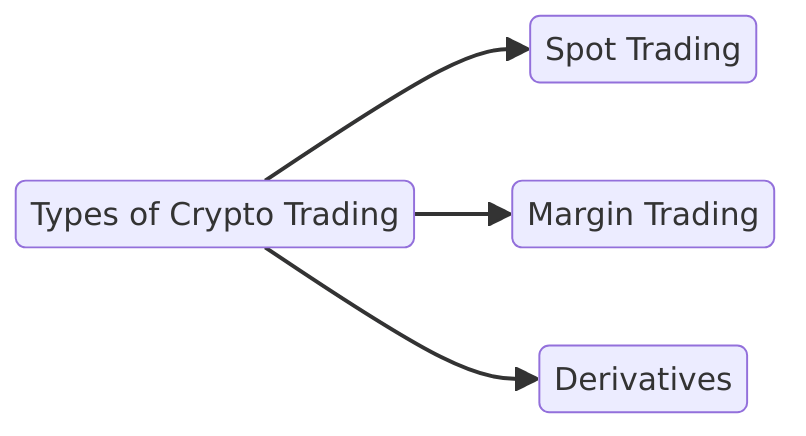
Each of these trading methods caters to different strategies and risk profiles, offering various ways to capitalize on the potential of the crypto market.
Advantages of Crypto Trading
24/7 Market
One of the most appealing features of crypto trading is that the market operates 24/7. Unlike traditional stock markets with fixed trading hours, crypto markets are always open, allowing traders to enter and exit positions at any time, day or night. This flexibility is especially valuable for those who have different schedules, such as part-time traders or individuals in different time zones. Platforms like eToro and AVATrade make it easy to take advantage of global opportunities, whether it’s early morning in New York or late at night in Asia.
High Volatility & Profit Potential
Crypto markets are known for their volatility, which can be both an advantage and a risk. Prices of digital assets like Bitcoin or Ethereum can experience massive swings, offering traders the potential for significant profits. For instance, Bitcoin’s price can fluctuate by thousands of dollars in a single day, creating opportunities for short-term traders to capitalize on these movements. However, the volatility also means that the market can quickly turn against traders, amplifying losses.
Low Barriers to Entry
Platforms like eToro and AVATrade make it easy for newcomers to get started in crypto trading with low minimum deposits, often as low as $10. This allows beginners to start small, test strategies, and grow their portfolios without risking significant amounts of capital.
Decentralized Nature
Cryptocurrencies operate outside traditional financial systems, offering more freedom and anonymity. With no central authority overseeing the market, crypto provides a more decentralized approach to trading and investing. This appeals to those seeking privacy and greater control over their investments, as transactions are often more secure and transparent.
These advantages make crypto trading an exciting opportunity for both new and experienced traders, offering flexibility, potential for high profits, and a degree of autonomy not found in traditional markets.
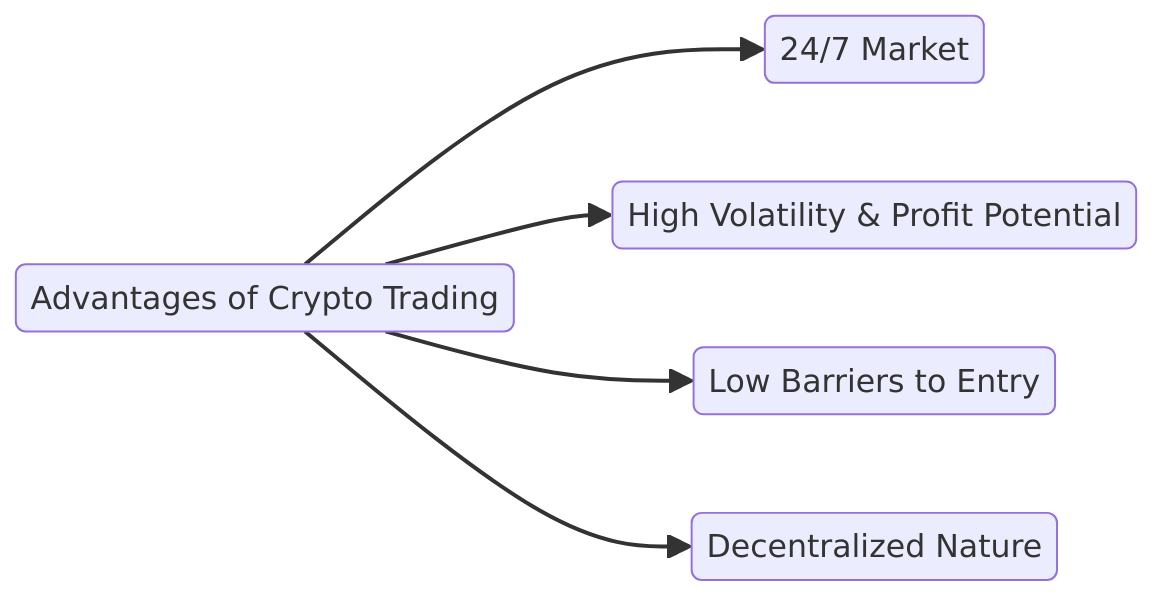
Challenges of Crypto Trading
High Volatility
The cryptocurrency market is renowned for its high volatility, which can lead to significant profits but also substantial losses. For instance, in early 2024, Bitcoin's price experienced a sharp decline of approximately 10% within a single week, influenced by the Federal Reserve's hawkish outlook for 2025 involving a slower pace of interest rate cuts.
Such rapid price fluctuations require traders to implement robust risk management strategies to navigate the market effectively.
Regulatory Uncertainty
The evolving regulatory landscape poses challenges for crypto traders. In December 2024, Hong Kong's Securities and Futures Commission approved four additional cryptocurrency exchanges, aiming to establish the city as a global hub for digital asset trading.
Conversely, other regions, like the United States, are still in the process of defining clear regulations for cryptocurrencies, leading to uncertainty and potential market instability. Traders must stay informed about regulatory developments in their jurisdictions to navigate these complexities.
Security Risks
Security remains a critical concern in the crypto space. In 2024, losses from cryptocurrency hacks surged by 21%, reaching a staggering $2.2 billion, marking the fourth consecutive year with losses exceeding $1 billion.
Notable incidents include the theft of over $305 million from Japan's DMM Bitcoin in May and $235 million from India's WazirX in July. These breaches highlight the importance of using secure platforms and implementing personal security measures to protect assets.
Therefore, using secure platforms like eToro or AVATrade, which offer additional security measures, can help protect against such risks.
Market Sentiment & News-Driven Movement
Crypto markets are highly sensitive to news and social media trends, leading to unpredictable price movements. For example, in May 2021, Elon Musk's tweet about Bitcoin's environmental impact led to a significant drop in Bitcoin's price.
Similarly, news of regulatory crackdowns in countries like China can cause sudden price declines. This sentiment-driven volatility makes it challenging to predict market movements, requiring traders to stay vigilant and adapt quickly to changing news and trends.
These challenges underscore the complexities of crypto trading. While the market offers substantial opportunities, it also requires a thorough understanding of its inherent risks and the implementation of effective risk management strategies.
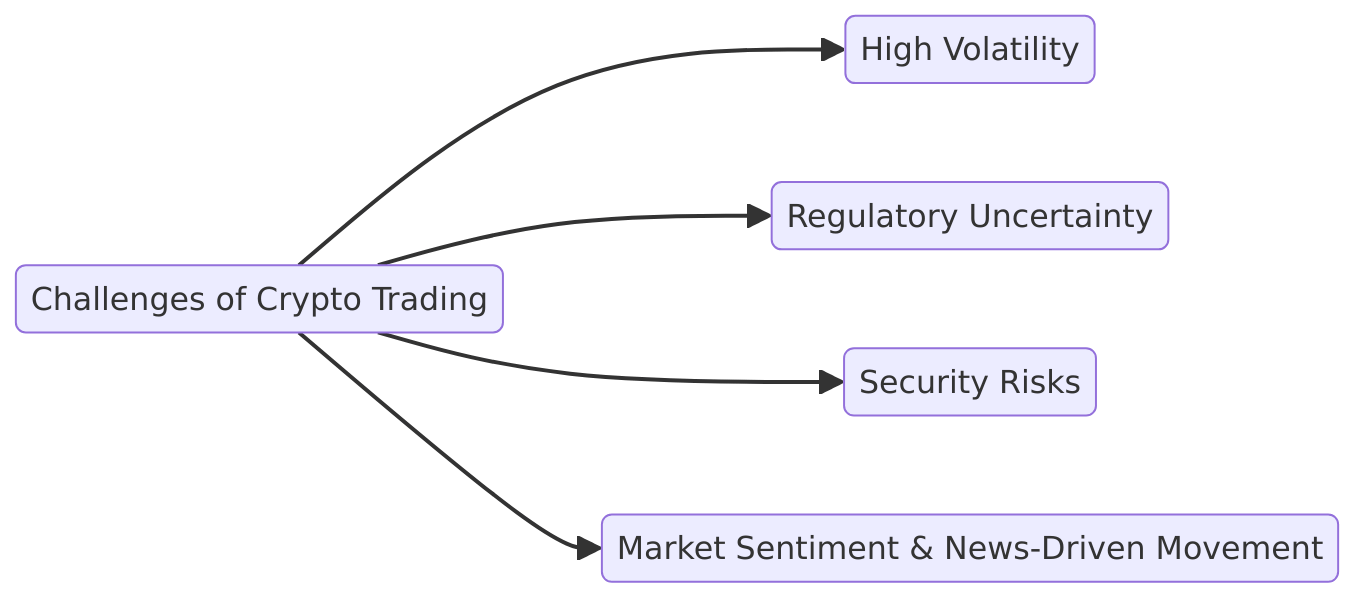
Are You Ready for Crypto Trading?
Before diving into the world of crypto trading, it's essential to assess whether it aligns with your financial goals and risk profile. Here’s how you can evaluate if you're ready:
Risk Tolerance
Crypto markets are highly volatile. Consider these points:
- Example: Bitcoin surged to nearly $65,000 in 2021, only to drop over 50% to $30,000 in the following months.
- Important Question: Are you comfortable with such dramatic price swings?
- Tip: If you're risk-averse, only allocate a small portion of your portfolio (5-10%) to high-risk assets like cryptocurrencies.
Trading Style
Decide which approach suits your goals:
- Short-Term Trading: Day traders or swing traders capitalize on price movements within hours or days. For example, a 5% daily swing in Bitcoin could be profitable for a short-term trader.
- Long-Term Holding (HODLing): Long-term traders buy and hold assets for years, like Bitcoin’s steady rise from $1,000 in 2017 to $60,000 in 2021.
- Important Question: Do you prefer short-term gains, or are you comfortable with holding investments for longer periods?
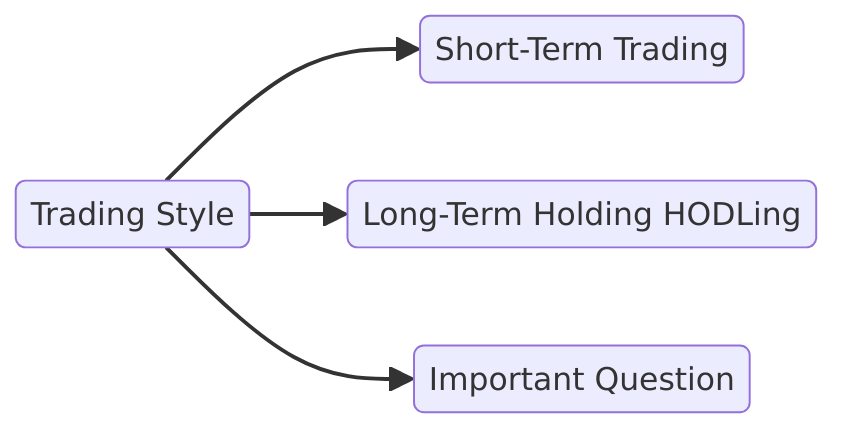
Knowledge & Research
Crypto trading requires a solid understanding of the market and its underlying technology. Consider these points:
- Stay Informed: Learn about key events like Bitcoin halving, which impacts its supply and can influence prices.
- Example: Ethereum's switch to Proof of Stake significantly impacted its market dynamics.
- Question: Are you willing to research market trends, news, and specific cryptocurrencies regularly to stay ahead?
Financial Commitment
Evaluate how much you're willing to invest and commit:
- Start Small: Begin with a small investment (e.g., $500) to test the waters. With $500, you can buy a fraction of Bitcoin, which is priced around $40,000 as of 2024.
- Risk Management: Only trade with money you can afford to lose.
- Diversify: Spread your capital across different cryptocurrencies to reduce the risk of significant losses from a single asset.
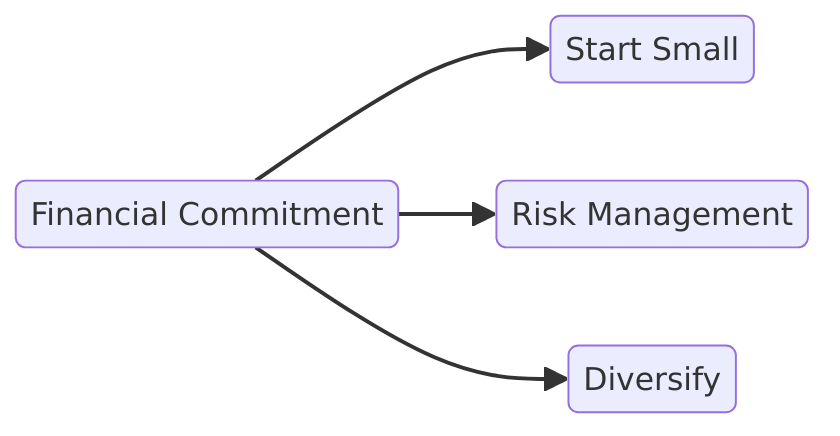
How to Get Started with Crypto Trading
Getting started with crypto trading can be simple if you follow these steps:
- Choose a Reliable Exchange: Select a platform with strong security and a user-friendly interface. Platforms like eToro, AVATrade, and Binance offer a wide range of cryptocurrencies to trade, as well as advanced security features to protect your funds.
- Set Up a Wallet: It's crucial to secure your cryptocurrencies in a personal wallet, such as a hardware wallet (e.g., Ledger or Trezor), rather than leaving them on exchanges. This adds an extra layer of protection from hacking and theft.
- Start with a Demo Account: Many exchanges, including eToro, offer demo accounts where you can practice trading with virtual funds. This is an excellent way to get familiar with the market and test your strategies without risking real money.
- Learn and Practice: Use the educational tools, tutorials, and resources provided by platforms to build your knowledge. Platforms like eToro and AVATrade offer courses, market analysis, and community support to help you improve your trading skills.
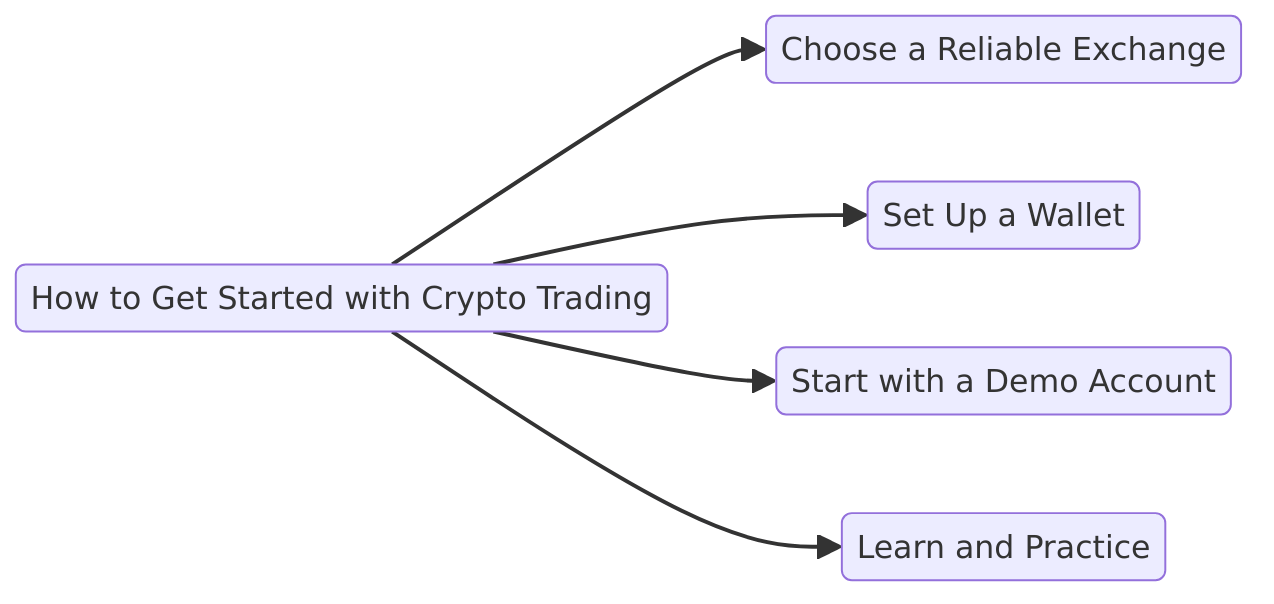
Conclusion
In summary, crypto trading offers great potential for profits, but it comes with high risk, volatility, and a steep learning curve. While the opportunity for significant returns is appealing, it’s essential to assess your risk tolerance and understand market dynamics before jumping in. Thorough research, staying informed about trends, and utilizing proper risk management strategies are key to success.
If you're ready to explore the world of crypto trading, we at WhereToTrade are just a chat away, ready to provide expert guidance and help you choose your broker with confidence.
Table of contents
1. Understanding Crypto Trading 2. Advantages of Crypto Trading 3. Challenges of Crypto Trading 4. Are You Ready for Crypto Trading? 5. How to Get Started with Crypto Trading 6. Conclusion






